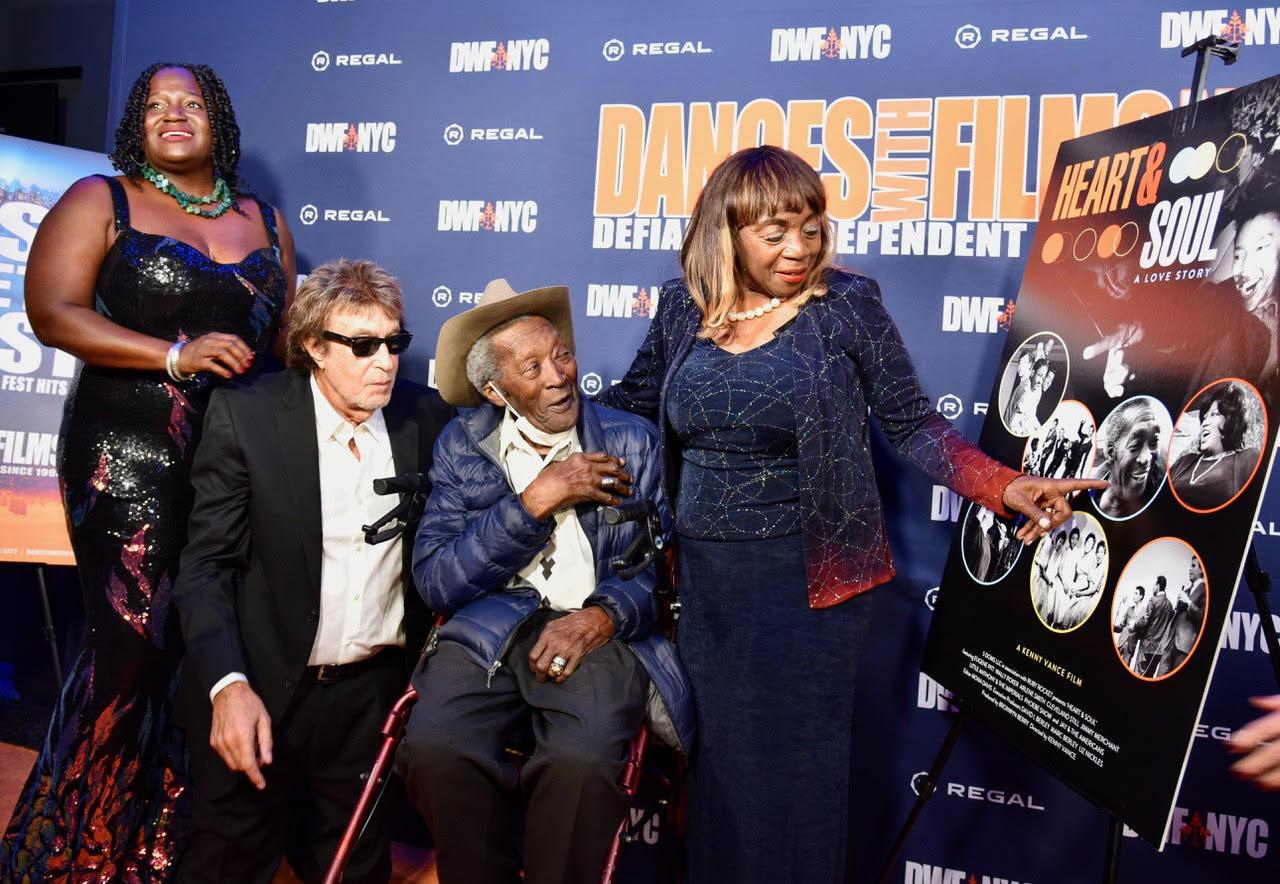
27 minute read
Black Music Month: California Celebrates History and Heroes
injustice wrong which will be imposed upon them and these will continue till they have resisted either with words or blows or with both. The limits
Despite Pushback From Franchise Owners, Assembly Passes Fast Food Worker Bill
Advertisement
Antonio Ray Harvey| California Black Media
Kenny Vance has a talent for creating vivid musical imagery.
If you ask the 79-year-old about his musical upbringing in 1950s Brooklyn, New York, Vance will describe wandering through the borough as a young man and listening to other young people sing harmonious tunes with no instruments from the neighborhood’s stoops. He will mention how groups would string together melodic lines in competitions with each other.
Vance notes how these melodic groups in the ‘50s and ‘60s, composed of African Americans, sang their way from their neighborhood stoops and other local spots in cities such as Chicago, New York, and Los Angeles to small recording studios. These vocalists, whose Rhythm-and-Blues singing style is known as doo-wop, would release a song or two and sometimes never be heard from again.
With his documentary “Heart & Soul: A Love Story,” Vance, a musician, actor, and film director, puts the musical talents of “unsung doo-whop heroes” like Frankie Lymon and the Teenagers, the Dubs, Little Anthony and the Imperials, and the Chantels in the limelight again. The film will be screened at the GRAMMY Museum in Los Angles on June 8 at 7 p.m. The two-hour showing in the museum’s 200-seat theater is part of its celebration of Black Music Appreciation Month this June.
The screening of Heart & Soul: A Love Story,” is just one-way individuals, businesses and organizations are commemorating Black Music Month throughout the state.
In Alameda County, The Black Music Month Festival will take place on June 17 from 2 p.m. to 6 p.m. at Love Center Ministries in Oakland.
Performers such as The Dynamic Miss Faye Carol & Her Trio, Bobi Cespedes, Stephanie Crawford, Netta Brielle, and the Glen Pearson Trio featuring Derick Hughes, Bernard Anderson, and Rico Pabon will take the stage.
Throughout June, Disneyland is also honoring the history of Black music by featuring three bands performing hits by Black artists from various decades on the Hollywood Backlot stage at the park.
Black Music Appreciation Month celebrates African American musical influences that make up an essential portion of America’s cultural heritage.
Established by President Jimmy Carter in 1979, it recognizes the history and rich musical traditions that gave rise to genres such as barbershop, blues, funk, gospel, hip-hop, jazz, and swing music.
Every president since Carter has continued the tradition, including President Joe Biden. Biden proclaimed June as Black Music Month in a May 31 statement.
“Today, the creative ways that Black music tells stories of trial and triumph in American life continue to move us all to understand the common struggles of humanity,” Biden’s proclamation reads. “This month, we celebrate the songs and artists that challenge us to think critically, stand up to injustice, and believe in ourselves. We recommit to expanding the promise of dignity and opportunity for all Americans. And we revel in the sounds, spirit, and soul of some of the very best music ever created.”
Back in Los Angeles, GRAMMY Museum Chief Curator & VP of Curatorial Affairs Jasen Emmons said “Heart & Soul” shows the musical innovation in the Black community.
“If you didn’t have access to instruments — this ability to get together and create vocal harmonies as a group — it doesn’t require access to certain things,” he stated. “You can do it anywhere — stoops, subways, street corners. I think of hiphop having similar innovation — despite the resources — to create something original and enduring.”
The film is a collection of video recordings shot by Vance over a decade with artists he befriended and worked with. The oral histories’ documentary features first-hand accounts of what it was like for young Black and Latino musicians to go into an entertainment industry that was unsure of how to manage the new artists’ sound.
Vance, prone to breaking out in melody himself while discussing the musicians featured in “Heart & Soul,” said the doo-wop performers — whose 50s’ and 60s’ heyday influenced later genres like rock ‘n’ roll and soul — oftentimes get no credit for their impact on American music culture.
Brand architect and television personality Erika Pittman will emcee the Los Angeles screening. Hip-hop icon Christopher “Kid” Reid, one half of the duo Kid ‘n Play, will deliver an opening monologue. Entertainment journalist Brande Victorian will lead an after-screening conversation with Vance.
Emmons hopes viewers gain a deep understanding of doowop music.
“There is an audience that deeply loves doo-wop and when the songs come on the radio, they evoke a lot of emotion in people,” he noted.
Last week, fast-foods franchise owners and other opponents of Assembly Bill (AB) 1228 suffered a setback when the State Assembly approved a bill that would grant national franchise corporations more control over their businesses.


The bill has been forwarded to the Senate for review.
The Fast Food Franchisor Responsibility Act, authored by Assembly Chris Holden (D-Pasadena), passed off the Assembly floor with 42 votes in favor of the legislation while 22 members of the Assembly voted against the bill.
“We've heard fast-food workers experience of wage theft, violence at work, sexual harassment and assaults, denied sick days, intense heat, poor work-place safety practices, and retaliation for speaking out,” said Holden before his colleagues voted on the bill.
“Well, this does not imply that all fast-food franchisees mistreat their workers. It is clear that we must ensure that our fastfood workers are able to thrive in their workplace and in their
According to the Employment Policies Institute, which reviewed wage claims from the California Department of Industrial Relations for the period of 2017 – 2022, the quick-service restaurant industry accounted for 1.6% of wage claims despite representing 3.2% of California’s workforce..
Holden, Mia Bonta (D-Alameda), Kevin McCarty (D-Sacramento), Issac Bryan (D-Los Angeles), Mike Gipson (D-Carson), Reggie Jones Sawyer (D-Los Angeles), (D-Los Angeles), Tina McKinnor (D-Inglewood), and Akilah Weber (D-La Mesa) – all members of the California Legislature Black Caucus – voted in favor of AB 1228.
Some opponents of AB 1228 say the bill was introduced to send a message to the fast-food industry.

“What is the bill really about?
I looked at this bill closely in the Judiciary Committee and I didn't see evidence that there
Protecting lives on the road during National Safety Month and beyond

Consequences of Distracted Driving and Speeding disproportionately impact Black lives
Free Job Training and Incentives Now Available for California Caregivers...continued
recognition that direct care jobs can be a gateway into a variety of personal and professional advancement opportunities.
The innovative program brings together dozens of training providers offering hundreds of virtual and in-person courses for caregivers across California. Courses cover a range of topics, including Alzheimer's Disease and Related Dementia, Cultural Diversity, Food Safety, Infection Control, Provider, and Consumer communication and more, with courses available in multiple languages.
COMMENTARY: Why We Need Diverse Books in Schools...continued
ELK GROVE, Calif. —June marks the beginning of summer and the observance of National Safety Month. The California Office of Traffic Safety (OTS) and Caltrans are calling on all drivers to prioritize safety and help raise awareness about current dangerous driving behavior and its disproportionate impact on Black communities in California and across the U.S.
According to the latest projections from the National Highway Traffic Safety Administration (NHTSA), more than 4,400 people were killed in traffic crashes in California in 2022, or 12 people every day. A disproportionate number of those deaths affect Black communities and people walking and cycling. People outside of vehicles do not have the same protections as people riding inside vehicles.
A recent study published by the American Journal of Preventive Medicine found that, on a national level, Black people experience a passenger vehicle fatality rate 73% higher than their white counterparts, with the highest overall traffic fatality rate per mile traveled and across all modes of transportation, including walking, cycling and driving. In California, Black pedestrians have a 65% higher fatality rate compared to white pedestrians.
In an era where screens dominate our attention, distractions behind the wheel have become an alarming issue. Using a phone to dial, talk or text doubles the risk of a driver getting into a crash. Sending or receiving a text message takes a driver’s eyes off the road for an average of 4.6 seconds. In 2020, 3,142 Americans were killed in crashes involving distracted drivers.
Other dangerous driving behaviors like speeding have also become increasingly normalized. Whether it involves exceeding the posted speed limit, driving too fast for conditions or racing, speeding was a factor in 29% of all national traffic fatalities in 2021. In California, 1,509 people were killed in speeding-related crashes in 2021.
To address the dangers of distracted driving, speeding and the disproportionate impacts each dangerous behavior has on Black lives, the OTS and Caltrans launched a call-toaction campaign that aims to establish a strong safety culture in California. You can join the Go Safely Movement and become a traffic safety champion by taking a short Community Call to Action survey to share what issues you are experiencing in your everyday travels. Your answers will assist the OTS and Caltrans in strengthening connections with communities, providing access to resources, and promoting traffic safety across transportation systems.
The OTS and Caltrans encourages everyone to prioritize safety by reminding drivers to practice the following behaviors:
• California has a handsfree cell phone law, which prohibits drivers from holding a phone or other electronic device while behind the wheel.
Drivers under the age of 18 may not use any mobile communications device at all, whether hands-free or hand-held.
• If you need to make a call or send a text, pull over and park at a safe location.
• Be Work Zone Alert. When you see flashing amber lights ahead and you’re approaching a work zone, slow down and Move Over a lane if it is safe to do so. It’s the law.
• Avoid the temptation of using the phone while driving altogether. Put the phone in the glove box, trunk, or back seat; anywhere you cannot reach.
Remember, there are other distractions: eating, grooming, reaching for something that fell on the floor, putting on or taking off clothing, deep conversations with passengers, or fussy children in the back seat. If you find yourself in any of these situations, find a quiet, safe place to park and address the distraction.
• Know and respect the speed limit. It’s not worth pushing the envelope to save a minute or two.
Be aware of your surroundings: Look out for pedestrians, cyclists, and obstructions in the road, especially in hard-to-see conditions such as at night or in bad weather.
Let’s work together to create safer roadways this National Safety Month and beyond. To learn more about the Go Safely Movement, visit gosafelyca. org/thegosafelymovement, and follow Go Safely on Facebook, Twitter, and Instagram @OTS_ CA and @GoSafelyCA.
Free Job Training and Incentives Now Available for California Caregivers
SACRAMENTO – To continue to build California’s health care workforce, the California Department of Aging (CDA) is announcing the launch of the CalGrows workforce training and development program.
Beginning today, CalGrows is open for registration with hundreds of courses available to caregivers working with older adults and adults with disabilities, helping support Californians on a path to a career in health care and ensuring the state retains highlyqualified health care workers.
“CalGrows training courses empower caregivers across California to learn valuable skills to improve the lives of those in their care and help further their careers,” said Susan DeMarois, Director of the California Department of Aging.
“As California’s population ages, we’ll need hundreds of thousands more direct care workers. The CalGrows program is an important milestone toward ensuring the state has the home care aides, care managers, dementia care specialists, activities coordinators, and other important roles necessary to support our aging population.”
“Care workers are more likely to be women and people of color, who are also at a higher risk for age-related illnesses,” said Dr. Mark Ghaly, Secretary of the California Health & Human Services Agency. “CalGrows demonstrates the State’s commitment to support caregivers, as well as those they care for, by providing training in six languages at launch, with more added soon, as well as career growth opportunities. This program is essential to help California achieve our goals in the Master Plan for Aging: to build a California for all ages and abilities.”
PROGRAM DETAILS:
CalGrows can help build individual skill sets, job satisfaction, and growth opportunities to help further careers and the retention of skilled, experienced caregivers for older adults and people with disabilities. Qualified applicants can also receive up to $6,000 in financial incentives. Free training for paid direct care workers, Home and Community-Based Services caregivers, and unpaid family and friend caregivers is available through the CalGrows website at www.calgrows.org. Most courses are available online, with others offered in person and are searchable by topic, location, language, and incentive. Caregivers in the paid direct care workforce are also eligible for financial incentives and career pathway development benefits.
Through the CalGrows Innovation Fund grants launched earlier this year, $89 million was awarded to 78 organizations across California. Grants were awarded to diverse organizations with innovative ideas to offer training and incentives for the direct care Home and Community-Based Services (HCBS) workforce and unpaid family and friend caregivers. For self-directed care workers through In Home Supportive Services (IHSS), optional training and compensations for training time are available through IHSS Career Pathways.
BIGGER PICTURE: The Workforce for a Healthy California Initiative is part of the state’s broader strategy to build a health workforce that represents California’s diverse communities and provides people with the quality care they deserve, while addressing the growing workforce shortages throughout the state’s health and human services system. The cornerstone of the Initiative comes from a once-in-a-generation, $1 billion plus investment from the 202223 state budget.
COMMENTARY: Why We Need Diverse Books in Schools
NNPA NEWSWIRE — “Education should be the space where you can learn about everything and anything that you want. There should be no limits to the creativity of the ideas and the dreams that you inspire into every child,” said Derrick Ramsey, co-founder of the nonprofit Young, Black & Lit.. “This really takes away a lot of that opportunity to see what you could be, even if you hadn’t thought about it before.”
Though he hopes the book empowers young Black boys, they aren’t the sole audience Davis has in mind.
“It’s a book for anybody who feels ‘other’ by the way they look, or anybody who has selfdoubt,” Davis says. “It’s a book that I want kids to read and feel empowered, feel like they have agency.”
The problem is that, around the country, books like Davis’ are being removed from the shelves of classrooms and school libraries. Books that feature Black protagonists or talk about Black history.
And that’s a problem.
Between books being banned, challenged, and removed from school shelves — and the College Board giving in to bullying and altering its AP African American Studies course — there’s a lot of talk about what should be taught in classrooms, how it should be done, and who should have a say.
We shouldn’t be hiding history from students because they need to learn the truth, says Kathy Lester, a middle school librarian and president of the American Association of School Librarians. Plus, when students find books they’re interested in, they read more, and it creates conversation and opens up topics for discussion.
“I always grew up thinking that we wanted to learn our history so we wouldn’t repeat it,” Lester says. “We can learn from it and grow from it.” project through a book, then that’s exciting to any student who wants to get into science.”
Davis says there’s more power in variety than singularity because there is so much more to learn.
“It’s a very dangerous act to not allow children and people the experience of reading a variety of different texts because that’s what informs us about the world. That’s what helps us build our ideas and thoughts around what we believe,” Davis says. “If we are showing kids a singular thing, then I think we’re alienating them and we’re manipulating them.”
The Message a Book Ban Sends
Banning these books sends a message — both to Black students and their non-Black peers.
“It sends a message to Black students that their history doesn’t matter, that it’s not important,” Lester says. “Then, for white students, that it’s not important for them to learn about it or that their history is more important — which are not good messages to be sent.”
And their non-Black peers are also harmed because they end up learning a lopsided view of history that ignores huge swaths of the American narrative, Richmond says.
“They won’t have the opportunity to really grapple with our shared past,” Richmond says, “to read primary sources, to ask probing questions, and to engage
“Investing in and growing our health care workforce is critical to the health and safety of Californians,” said Governor Newsom. “As the entire United States faces a health care worker shortage, the CalGrows initiative is yet another tool California is using to ensure our health care workforce remains strong by providing opportunities to those already caring for loved ones.”
WHY THIS IS IMPORTANT: CalGrows is grounded in the
Of the banned books studied by PEN America, they were most likely to have LGBTQ+ content (41%) or characters of color (40%). Among the top reasons for book bans were titles having to do with race or racism (21%), and titles with themes of rights or activism
By Maya Pottiger | Word in Black
Ever since he was young, Marchánt Davis has always loved children’s media and the power it possesses. Though his favorites were “Sesame Street” and “Reading Rainbow” — especially seeing himself represented on screen through LeVar Burton — he says he was “strangely” inspired by “Snow White.”
“It was always playing on TV,” says Davis, an actor, director, writer, and now author of “A Boy and His Mirror.” And it was this story that he wanted to repurpose for his own children’s book geared toward the current generation.
Thinking about the relationship kids have with their phones and what identity means, Davis wanted to create a story that spoke to people coming up in a world with Tik Tok, Instagram, Twitter, and Snapchat.
But, mostly, Davis wrote the book hoping young Black boys would read it. Though he doesn’t believe any one thing will cure problems, he wants the book to be a step toward boys acknowledging their feelings and countering some of the toxic masculinity in the Black community.
Davis called back to what Sheryl Lee Ralph said in her acceptance speech at the Critics Choice Awards: “When you look in the mirror, you gotta love what you see,” Davis quoted. “And so, I wrote a book in an effort to help kids look in the mirror and love what they see.”
We can’t understand our current politics and culture without understanding the treatment of African Americans in the United States, as well as the integral role they’ve played in shaping the country, says Caroline Richmond, the executive director of the nonprofit We Need Diverse Books.
“In order for us to be the nation that we claim to be — a land where all people are created and treated as equals — we have to teach our children how this has not been and still is not the case today,” Richmond says. “And so, if we’re not teaching Black history in our schools, then our students — of all races and backgrounds — are not receiving a holistic education.”
In its “Banned in the USA” report, PEN America collected book bans in states around the country between July 1, 2021, and June 30, 2022. The analysis found that bans occurred in 138 school districts across 32 states, and these districts represent 5,049 schools with a combined enrollment of nearly 4 million students.
While the majority of states with reported bans saw less than 50, some states racked up over 100, with Texas topping the list at 801 bans.
But it’s not just about history books. For Black and Brown kids, it’s about seeing yourself represented in history, in a book, but also in the daily experiences that children face. “We want our kids — and we want every kid — to be able to see the experiences of Black children in the books that they read because it makes every person more relatable,” says Derrick Ramsey, co-founder of the nonprofit Young, Black & Lit. “If you can see that person, a Black student, doing a science in thoughtful discussion and build empathy. Acknowledging past harm and our current inequitable society is the first step in creating real, long-term, sustainable change.”
Of the banned books studied by PEN America, they were most likely to have LGBTQ+ content (41%) or characters of color (40%). Among the top reasons for book bans were titles having to do with race or racism (21%), and titles with themes of rights or activism (10%).
When thinking about these book bans, Davis thinks there are some important questions to ask those doing the banning: What do you want? What do you want Black children to feel by removing those books? What does removing them actually do?
“I’m just like, ‘Why?’” Davis says. “What’s your intention? What are you saying to the kids about that book, specifically?”
For Ramsey, the message is clear: “Your history doesn’t matter. Your experiences don’t matter. Who you are doesn’t matter.” It’s a challenging space for a child who is already trying to find their path in the country and in the world.
Plus, it’s not just talking about Black history or Asian history, Ramsey says, it’s American history.
“Education should be the space where you can learn about everything and anything that you want. There should be no limits to the creativity of the ideas and the dreams that you inspire into every child,” Ramsey says. “This really takes away a lot of that opportunity to see what you could be, even if you hadn’t thought about it before.”
The post Why we need diverse books in schools appeared first on AFRO American Newspapers

NYC Banking Commission to limit deposits at Capital One, KeyBank
County/Business News
Business leaders urge legislators to pass $180 billion infrastructure plan
County/Government/Business News
SACRAMENTO, Calif. (June 5, 2023) — California business leaders overwhelmingly support Gov. Gavin Newsom’s $180 billion infrastructure proposal that would equip the state to build vital projects faster, while creating an estimated 400,000 construction-related jobs.
State Treasurer Fiona Ma Announces Approval to Implement $150 Million Loan Program for California’s Financially Distressed Hospitals...continued
The NYC Banking Commission’s first-ever public hearing ended with a vote from all three commission members (Comptroller Brad Lander, Mayor Eric Adams, and Finance Commissioner Preston Niblack) that urged NYC to limit its deposits at Capital One and KeyBank.
Both banks refused to submit required plans showing how they would root out discrimination in employment, services, and lending at their branches.
The commission’s vote calls for a freeze on new deposits in Capital One and KeyBank for up to two years. Capital One held $7.2 million in NYC deposits at the end of April in 108 accounts and KeyBank held $10 million in NYC deposits at the end of April in three accounts, Lander’s office said. “Banks seeking to do business with New York City must demonstrate that they will be responsible managers of public funds and responsible actors in our communities,” Lander said. “Unfortunately, despite several opportunities to do so, five banks failed to comply with the New York City Banking Commission’s designation process––leaving us to conclude that they are not taking meaningful actions to combat discrimination in their operations and are not responsible stewards of public dollars.”
Lander also voted against designating three other banks to hold public funds: International Finance Bank, PNC Bank, and Wells Fargo. These banks also failed to demonstrate they were taking action to prevent discrimination in branch openings and closings, lending decisions, hiring, and other operations.
According to Lander’s office, “At the public hearing, the Banking Commission heard testimony from Muslim New Yorkers who have experienced discrimination in the process of opening or closing accounts. Tenants expressed concerns about predatory lending practices by banks that jeopardize their rights and safe living conditions.
Climate advocates condemned banks that have continued to lend billions of dollars for fossil-fuel expansion, despite having made net-zero commitments. Members of the public also spoke in favor of creating a public bank that could provide banking services for City deposits and deploy that capital to better serve New York communities.”
San Manuel Band Of Mission Indians Announces Acquisition Of An Ownership Interest In Waldorf Astoria
Monarch Beach Resort & Club
County/Business News
Tribe teams up with Ohana Real Estate Investors as coowners of the iconic awardwinning AAA Five-Diamond coastal resort in Orange County San Manuel Indian Reservation
Near Highland, CA (June 5, 2023) - The San Manuel Band of Mission Indians (“SMBMI” or “San Manuel” or “Tribe”) today announced that the San Manuel Investment Authority (“SMIA”) through its affiliated entities acquired an ownership interest in the newly renovated Waldorf Astoria Monarch Beach Resort & Club (“Waldorf Astoria Monarch Beach” or “Waldorf Astoria”) in Dana Point, Calif.
One of Southern California’s iconic luxury resort destinations, Waldorf Astoria Monarch Beach will be the Tribe’s latest addition to its expanding resort portfolio.
“Investing in a luxury destination resort such as Waldorf Astoria Monarch Beach represents another milestone for our Tribe, enabling us to continue executing our longterm diversification strategy,” said SMBMI Chairwoman Lynn Valbuena. “The stunning coastal setting, along with its exceptional guest service and amenities, are features that our Yaamava’ and Palms guests will enjoy. We are excited to partner with Ohana Real Estate Investors and impressed with Hilton and Waldorf Astoria’s strategic repositioning of the property over recent years.”
“We are proud to join forces with San Manuel to advance the growth of this wonderful asset,” said G. Christopher Smith, Founder and CEO of Ohana Real Estate Investors (“Ohana”). “San Manuel and Ohana share
Nearly 90 nonpartisan business associations representing all sectors and regions of California signed a letter this week urging swift passage of all 10 bills in the governor’s plan. The association leaders, listed below, cited the urgent need for investments to upgrade the state’s aging infrastructure, spur creation of good-paying jobs and help meet ambitious climate goals.
The letter was delivered to all members of the California State Legislature by the New California Coalition (NCC), a nonpartisan civic movement that advocates for common-sense solutions to improve statewide livability.
The governor’s sweeping plan includes provisions that modernize a state environmental law long weaponized to sabotage essential infrastructure and housing projects. It caps certain lawsuits filed under the California Environmental Quality Act (CEQA) to nine months, mirroring a “shot clock” solution advanced by NCC and its network of statewide partners.
The plan will also supercharge the creation of semiconductor manufacturing jobs in California. NCC was an early and vocal booster of efforts to improve California’s competitiveness for funding unlocked by passage of the federal CHIPS and Science Act. A Dec. 2022 report published by NCC examined how California could address workforce and regulatory barriers – including project delays caused by CEQA lawsuits – to help the high-cost state leverage its many competitive advantages.
“We strongly support this plan that will speed up construction, expedite court review, smooth permitting and address the abuse of the CEQA process that has halted key projects,” business leaders wrote in their letter.
“The 88 diverse signatories and logos on this letter represent only one pillar of the statewide base standing up this historic proposal. Business leaders are proud to stand with labor, environmental and community groups to support Gov. Newsom’s plan because it will improve everyday access to water, transportation, clean energy and other vital infrastructure needs,” said NCC Co-Leader Tracy Hernandez, who also serves as Founding CEO of the Los Angeles County Business Federation “BizFed.”
“Our grassroots advocacy campaign isn’t over until this proposal is signed into law. NCC leaders will testify at committee hearings every day this week to remind legislators how delaying approval of this package will disproportionately hurt Californians with the greatest need,” said NCC CoLeader Jim Wunderman, who also serves as President & CEO of the Bay Area Council.
State Treasurer Fiona Ma Announces Approval to Implement $150 Million Loan Program for California’s Financially Distressed Hospitals
County/Government News
SACRAMENTO – California get this critical program off the ground and help keep these hospitals open."
California’s not-for-profit and public hospitals are integral to the state’s healthcare system and provide substantial levels of care to the uninsured and MediCal and Medicare populations. Rising operating expenses and other costs have outpaced reimbursement rates, causing some facilities to close or declare bankruptcy, while others have struggled to stay afloat.
To address the growing crisis, Governor Gavin Newsom signed Assembly Bill 112 on May 15, which created the Distressed Hospital Loan Program (DHLP), a partnership between the Department of Health Care Access and Information (HCAI) and CHFFA to provide $150 million in zero-interest loans to these financially distressed hospitals.
The CHFFA board approved a resolution today that enabled the executive director and staff to work with HCAI to implement DHLP and to issue the loans. HCAI and CHFFA will continue to work to establish a loan application review methodology and plan to have an application live in June. More information can be found at CHFFA and HCAI’s websites. CHFFA was established in 1979 to provide financial assistance to public and nonprofit health care facilities through loans, grants, and taxexempt bonds. The diverse nature of the facilities funded by CHFFA reflects California’s changing health care needs. From rural community-based organizations to large multi-hospital systems, CHFFA has financed a wide range of providers and programs throughout the state.
Residents Can Soon Receive up to $12k for Upgrading to An Electric Vehicle
County/Business News in disadvantaged communities. RYR.png
DIAMOND BAR – The South Coast Air Quality Management District (South Coast AQMD) Governing Board approved $40 million in funds from the California Air Resources Board for the Replace Your Ride program. Eligible participants can receive up to $12,000 per voucher later this fall, an increase from the current amount of $9,500, to purchase a newer more fuel efficient vehicle at reduced cost, in exchange for retiring their older gas or dieselpowered vehicle. Applicants can also choose to scrap their older vehicle in exchange for a voucher that can be used for an electric bike, car sharing, or public transportation passes.
To be eligible for the program, applicants must:
Not exceed household income requirements based on family size and federal poverty rates
Own the vehicle for at least 12 months prior to the date of application submittal
Clear any liens from the vehicle title
Turn in an older gas- or dieselpowered car for scrapping a common vision for Waldorf Astoria Monarch Beach’s future, one where we will continue to elevate its world-class offerings while providing an unparalleled experience to our discerning guests.”
SMIA’s investment in Waldorf
Astoria Monarch Beach consists of an approximately 40% interest in the property with the option to increase its ownership through one or more future transactions.
The blufftop resort overlooking the Pacific Ocean is one of California’s most sought-after destinations, renowned for an array of luxurious amenities for resort guests and members.
Waldorf Astoria Monarch Beach boasts 400 newly refreshed guest rooms and suites, a private beach club, seven dining destinations including Michael Mina’s Bourbon Steak, Waldorf Astoria Spa & Salon, three pools, expansive indoor and outdoor meeting and event spaces, and an 18-hole championship golf course.
SMBMI owns and operates Yaamava’ Resort & Casino at San Manuel on the Tribe’s Reservation in Highland, Calif.
A governmental instrumentality of the Tribe, the San Manuel Gaming & Hospitality Authority (“SMGHA”), became the first Native American owners and operators of a casino resort in Las Vegas with the purchase of Palms Casino Resort which reopened under the SMGHA’s ownership in April 2022.
Jefferies LLC and Berkadia Real Estate Advisors LLC acted as financial advisors, and Goodwin Procter LLP acted as legal counsel for San Manuel in relation to this investment.
State Treasurer Fiona Ma today announced that the California Health Facilities Financing Authority (CHFFA) has taken action to enable the implementation of a $150 million emergency loan program for California’s financially distressed non-profit and public hospitals.

"Californians depend on these hospitals for health care and emergency services, and today’s approval is going to help keep the doors open," said Treasurer Ma, who also serves as chair of the CHFFA board. "These facilities are often the only source of healthcare in rural and remote parts of the state and keeping them open can be a life-ordeath matter. My team is already working closely with Governor Newsom’s administration to continued in next 2 columns
Since the program’s inception, South Coast AQMD has provided over $77 million in funding and replaced over 9,700 older passenger vehicles with newer fuel-efficient vehicles, e-Bikes and transportation vouchers which have resulted in reducing 27 tons of NOx, 1.5 tons PM, and 37,193 tons of GHG emission annually. Approximately 93 percent of the vouchers have been issued to low-income participants residing
For a full list of requirements and to apply for free, please visit ReplaceYourRide.com and select the Get Started tab. If you are interested in applying, please determine your eligibility, or call (844) 797-2223 for further information.
South Coast AQMD is the regulatory agency responsible for improving air quality for large areas of Los Angeles, Orange, Riverside and San Bernardino counties, including the Coachella Valley. For news, air quality alerts, event updates and more, please visit us at www.aqmd.gov, download our award-winning app, or follow us on Facebook, Twitter and Instagram.
Despite Pushback From Franchise Owners, Assembly Passes Fast Food Worker Bill...continued from page 1 are more labor violations in the fast-food industry than in other sectors,” said Assemblymember Bill Essayi (R-Corona) before the vote.
“Well, I think what this bill is about is retaliation. It's retaliation against an industry that dares to stand up to this body and to pass or qualify a referendum to undo a really bad law that's going to drive up food costs for every Americans,” he continued.
In the weeks leading up to the vote, a coalition of franchise fast food restaurant owners across California launched a votereducation campaign against AB 1228.
The Stop the Attack on Local Restaurants was buttressed by a public outreach with 30-second ads. The ads featured diverse California franchise restaurant owners sharing their concerns about ways AB 1228 would infringe on their rights to manage their small businesses.
“AB 1228 would destroy franchise businesses like mine,” said Mat. A., a Black restaurant owner in Lake Elsinore who appears in one of the ads the group released.
Last month, over 100 local franchise restaurant owners rallied at the State Capitol in Sacramento to push back against AB 1228. They argue that the bill would cut off one of the best pathways to business ownership for minority entrepreneurs. The owners were joined by social justice advocates, other small businesses owners, ethnic business leaders, and several representatives from restaurant brands and trade associations.
“It would destroy our business. We’ve worked hard to build a legacy for our family to take care of our employees and take care of our customers,” businessman Percy Johnson told California Black Media at the Citizen Hotel in downtown Sacramento, where the franchisees held a news conference.
Johnson owns eight McDonald’s restaurants in the Sacramento area that he operates with members of his family. He’s been a franchisee for approximately 26 years and his restaurants employ at least 300 people.
In addition to running a successful chain of restaurants, Johnson said he participates in community activities, gives back money to support humanitarian causes, and supports other small businesses.
AB 1228, authored by Chris Holden (D-Pasadena), would void any agreement between a franchise restaurant and its corporate parent that waives liability for violations against the franchisor.
Making the case for AB 1228, Holden explains that some franchisees violate employee rights at a far higher rate than establishments owned and operated by the franchisor.
“I believe many franchisees want to do right by the people that work for them but may not see it as possible under their franchisor's terms and conditions. This can help to provide some relief while protecting employees and businesses,” said Holden in a statement.
Owners argue that without specialized agreements between franchisors and franchisees, they would be constrained by broad corporate restrictions which often force them to choose between profitability and following standards.
However, supporters of AB 1228 say franchisees would have the opportunity to file action against their corporate parents if abiding by the franchisor's terms infringes on their ability to comply with employment laws.
Jai Coward and his wife
Kayla Coward are the owners of a Dog Haus franchise in Santa Clara they opened in 2010. Their franchise has grown to 55 locations, including eight restaurants in Texas. When the Cowards were first granted a franchise license, they immediately started planning to expand – acting on a dream they had since college. Now, the Cowards are hoping that AB 1228 will not kill their dreams.
“The whole reason why we went into business is to do business for ourselves. I am here doing this for us and our community. I don’t want to be a manager. I can go get a corporate job,” Jai Coward said. “Honestly, for us, I think we’re looking outside of California (if AB 1228 becomes law). Our brand, Dog Haus, we’re franchising nationwide now. For us, it might be us looking at other states and other opportunities as well.” California is home to more than 15,000 franchised quick-service restaurants in every region of the state. The overwhelming majority of franchised restaurants are locally-run and operated by small business owners –many of whom are people of color, women, immigrants and veterans.
According to a study by Oxford Economics, nearly 50% of McDonald’s owners and operators in California are people of color.
Marisol Sanchez and her family own three McDonald’s franchises that she says are employee-friendly, profitable and connected to the community. Some of Sanchez’s employees have worked for the family for 30 years.
The business helps employees achieve the American dream, she said.
“We provide our employees with more than just a paycheck. We’ve helped dozens of our crew members pursue citizenship, become homeowners with down payment assistance, and apply for college for tuition assistance,” Sanchez said.





